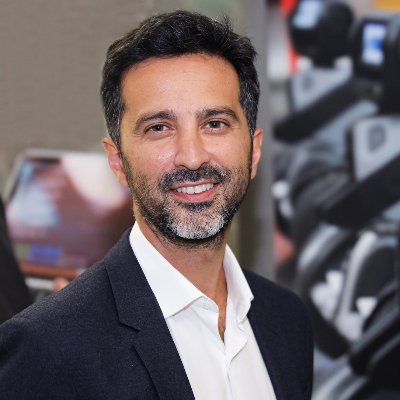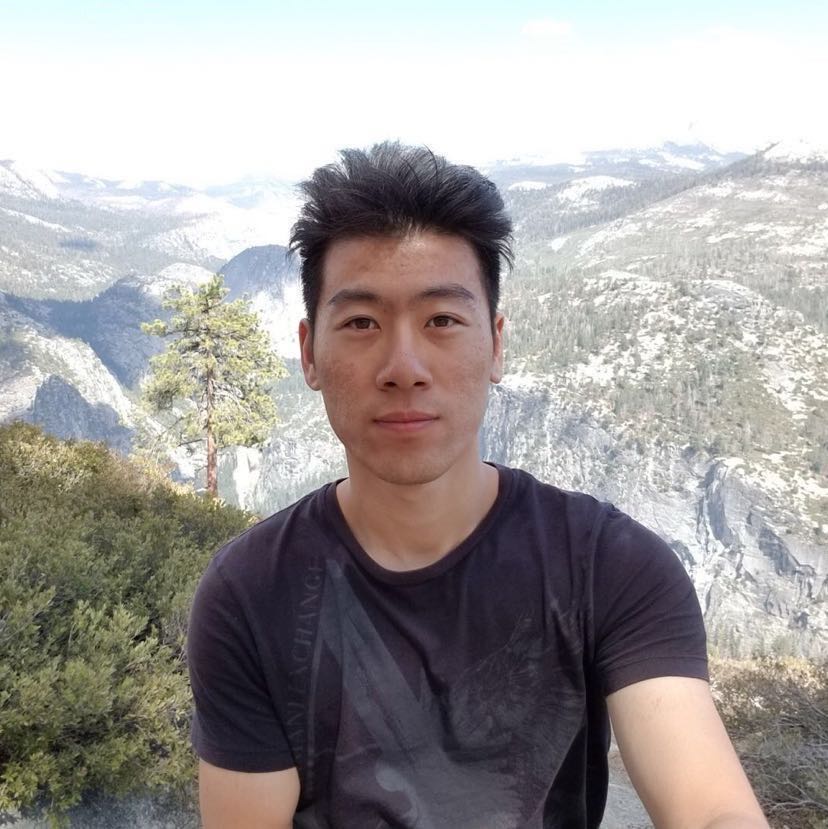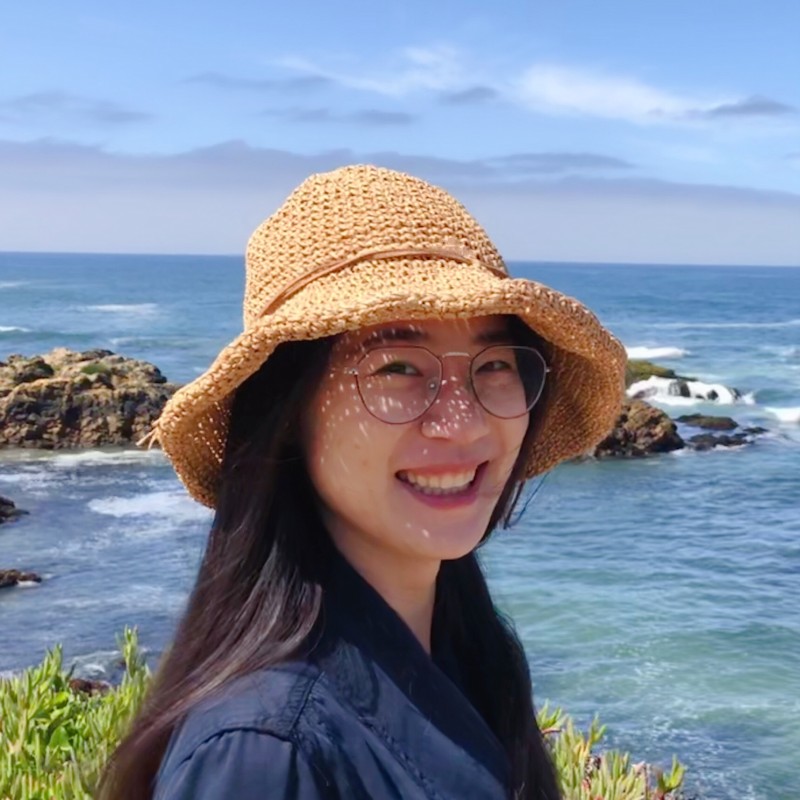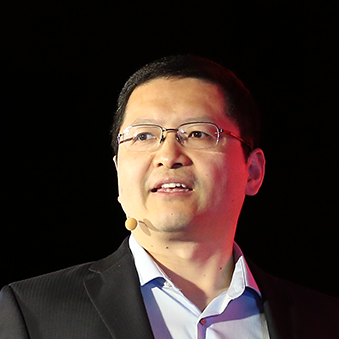The CVPR 2023 Workshop on Autonomous Driving (WAD) aims to gather researchers and engineers from academia and industry to discuss the latest advances in perception for autonomous driving. In this full-day workshop, we will host speakers as well as technical benchmark challenges to present the current state of the art, limitations and future directions in the field - arguably one of the most promising applications of computer vision and artificial intelligence. The previous chapters of this workshop attracted hundreds of researchers to attend. This year, multiple industry sponsors are also joining our organizing efforts to push it to a new level.
Challenges
Speakers
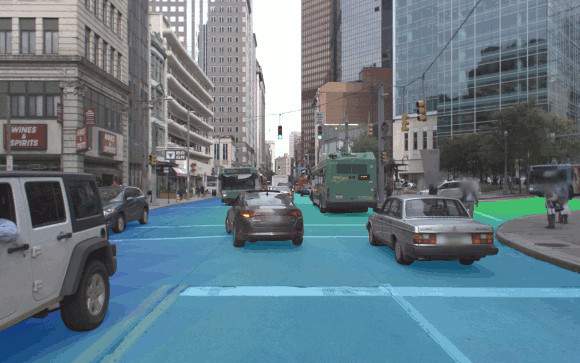
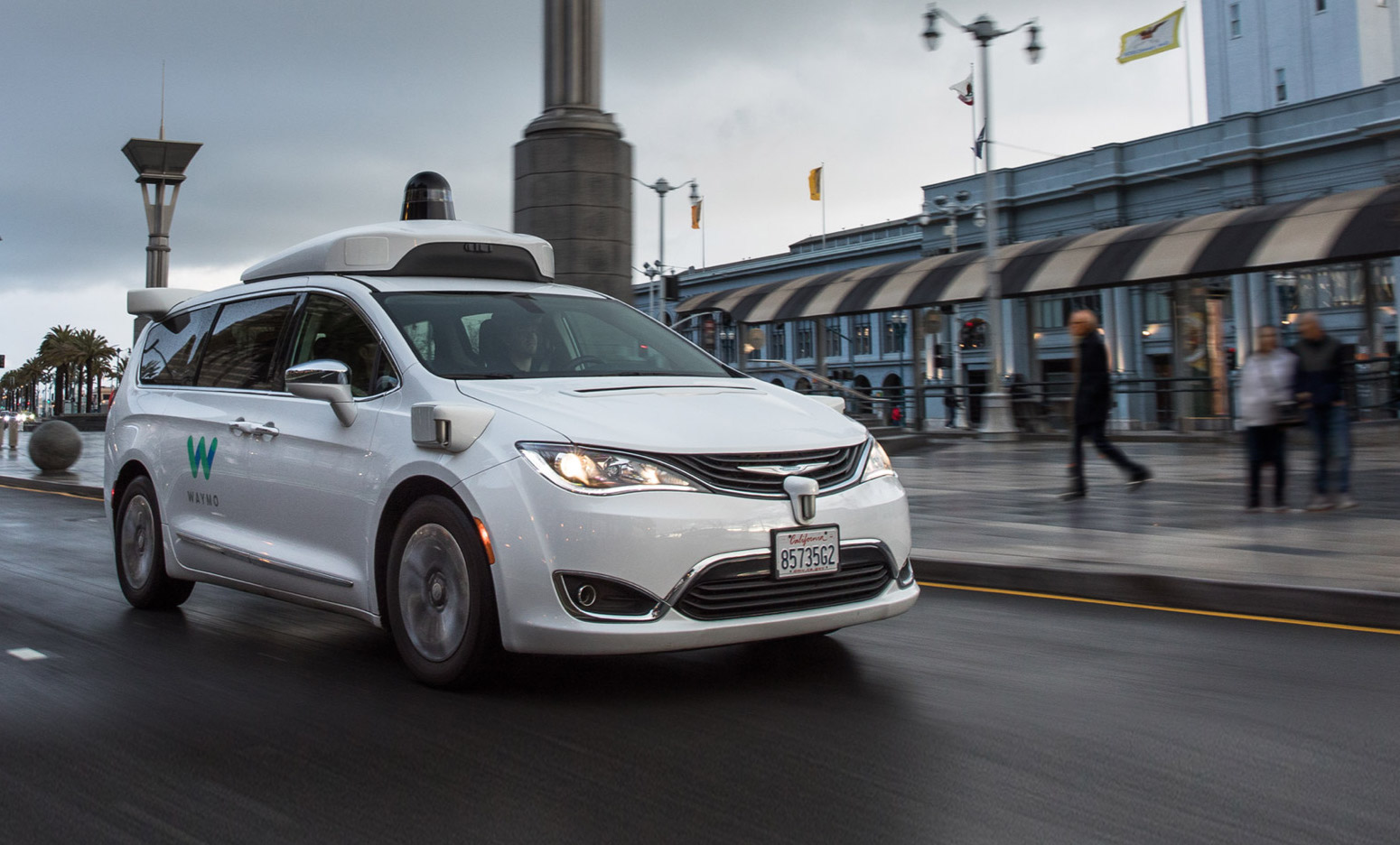
Sunday, June 18
East Ballroom C, Vancouver Convention Centre
Local time, Vancouver (PST)
Recordings are now available on our YouTube channel
and also linked below (click on title).
09:15am |
09:30am |
Opening Remarks |
09:30am |
10:00am |
|
10:00am |
10:30am |
|
10:30am |
11:30am |
|
11:30am |
01:00pm |
Lunch Break & Poster Session |
01:00pm |
01:30pm |
|
01:30pm |
02:00pm |
|
02:00pm |
02:30pm |
|
02:30pm |
03:00pm |
|
03:00pm |
03:15pm |
Coffee Break |
03:15pm |
03:45pm |
|
03:45pm |
04:45pm |
|
04:45pm |
05:00pm |
Coffee Break |
05:00pm |
05:30pm |
|
05:30pm |
06:00pm |
|
06:00pm |
06:15pm |
Closing Remarks |
- [June 29] Workshop recordings are available now on the CVPR virtual site, our YouTube channel, and also linked in the schedule.[June 18] Our workshop has concluded. Thanks to everyone involved! Recordings will be posted here within the next few weeks.[June 17] You can find our posters at boards #23-#38 in the West Exhibit Hall from 11:30am - 1:00pm.[June 16] The Waymo Open Dataset Challenge reports are available now and can be found below.[June 12] Please note an update to the schedule in the early afternoon slot.[April 5] The Argoverse Challenges are also open now! Find details below.[April 3] We sent out author notifications for submitted papers.[Mar 30] The BDD100K Challenges are also open now! Find details below.[Mar 16] The Waymo Open Dataset Challenges are open now! Find details below.[Mar 6] Submissions to our paper track have now closed. Stay tuned for the dataset challenges which will be announced soon![Feb 28] We extended the paper submission deadline to March 6, 2023.[Feb 24] We are now accepting submissions for our paper track! Please refer to our Call for Papers for more details.[Jan 8] The workshop got accepted.Challenges
We will host three challenges to promote research in computer vision and motion prediction for autonomous driving. Waymo, Berkeley DeepDrive and Argoverse have prepared large-scale benchmark datasets with high-quality ground truth annotations. We invite researchers around the world to invent new algorithms to tackle a range of challenging, realistic autonomous driving tasks.
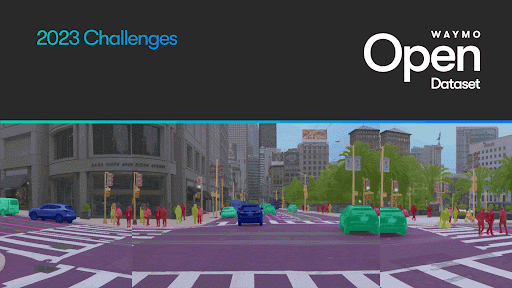
Challenge 1: Waymo Open Dataset Challenges
The 2023 Waymo Open Dataset Challenges are now live! We are inviting researchers to participate in four challenges.
- 2D Video Panoptic Segmentation Challenge: Given a panoramic video of camera images, produce a set of panoptic segmentation labels for each pixel in each image, where each object in the scene is tracked across cameras and over time.Pose Estimation Challenge: Given one or more lidar range images and associated camera images, predict 3D keypoints for pedestrians and cyclists in the scene, up to 25m from the ADV.Motion Prediction Challenge: Predict the future positions of multiple agents in the scene given 1 second of past history. We have made lidar sensor data available as a model input.Sim Agents Challenge: Produce sim agent models that control agents in the scene, which will be evaluated against the goal of being human-like. This is the first competition on simulated agents, a fundamental but relatively underexplored topic in autonomous driving, now available to the research community.
First-place winners in each of the four Challenges will receive $10,000 in Google Cloud credits. Additionally, teams with the best performing or noteworthy submissions may be invited to present their work (here!) at the Workshop on Autonomous Driving at CVPR. The 2023 Waymo Open Dataset Challenges close at 11:59 PM Pacific on May 23, 2023, but the leaderboards will remain open for future submissions. The Challenges’ rules and eligibility criteria are available here.
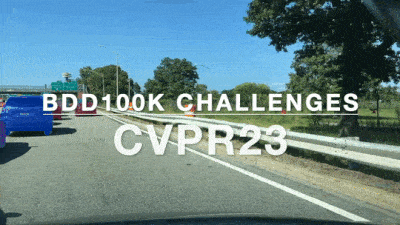
Challenge 2: BDD100K Challenges
Object tracking is one of the most fundamental problems in computer vision, with direct applications in autonomous driving. Accurate tracking in the perception system can lead to more accurate future prediction and planning in driving systems. Although we have a large amount of video data, the popular multi-object tracking challenges and benchmarks only provide tens of image sequences for training and testing. Therefore, we are hosting large-scale tracking challenges to invite computer vision researchers and practitioners to study the multi-object tracking problem in a more realistic setup. We hope our challenges can lead to new advances in computer vision and new pragmatic algorithms for self-driving cars.
- Multiple Object Tracking (MOT): Given a video sequence of camera images, predict 2D bounding boxes for each object and their association across frames.Multiple Object Tracking and Segmentation (MOTS): In addition to MOT, also predict a segmentation mask for each object.
The challenges will end at 5 PM GMT on June 7, 2023. There are more than $3,500 in cash prizes and the winners will get a chance to present their findings along with the renowned invited speakers in this workshop. For more information, please check out our challenge website here.
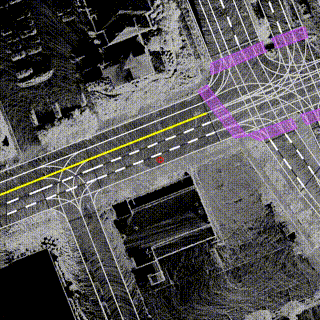
Challenge 3: Argoverse Challenges
Argoverse is hosting four competitions this spring:
- Multi-agent Forecasting using the Argoverse 2 Motion Forecasting Dataset. Given the position, orientation, and category of actors in a scene, predict the future motion of several key actors in the future.Unified Sensor-based Detection, Tracking, and Forecasting using the Argoverse 2 Sensor Dataset. Detect, Track, and Forecast 26 categories of objects.Lidar Scene Flow evaluated using the Argoverse 2 Sensor Dataset, but with training data available in the large, unannotated Argoverse 2 Lidar Dataset.3D Occupancy Forecasting using the Argoverse 2 Sensor Dataset. Predict the spacetime occupancy of the world for the next 3 seconds.
Top performing teams will be highlighted at the workshop.
Call for PapersImportant Dates
- Workshop paper submission deadline:
March 3, 2023March 6, 2023 (23:59 PST)Notification to authors: March 31, 2023Camera ready deadline: April 7, 2023Topics Covered
Topics of the papers include but are not limited to:
- Autonomous navigation and explorationVision based advanced driving assistance systems, driver monitoring and advanced interfacesVision systems for unmanned aerial and underwater vehiclesDeep Learning, machine learning, and image analysis techniques in vehicle technologyPerformance evaluation of vehicular applicationsOn-board calibration of acquisition systems (e.g., cameras, radars, lidars)3D reconstruction and understandingVision based localization (e.g., place recognition, visual odometry, SLAM)
Presentation Guidelines
All accepted papers will be presented as posters. The guidelines for the posters are the same as at the main conference.Submission Guidelines
- We solicit short papers on autonomous vehicle topicsSubmitted manuscript should follow the CVPR 2023 paper templateThe page limit is 8 pages (excluding references)We do not accept dual SubmissionsSubmissions will be rejected without review if they:
- contain more than 8 pages (excluding references)violate the double-blind policy or violate the dual-submission policyThe accepted papers will be linked at the workshop webpage and also in the main conference proceedings if the authors agreePapers will be peer reviewed under double-blind policy, and must be submitted online through the CMT submission system at: https://cmt3.research.microsoft.com/WAD2023
Accepted PapersThe poster session will be held from 11:30am to 1:00pm in the West Exhibit Hall at poster board #23-#38.
Does Image Anonymization Impact Computer Vision Training?
Authors: Håkon Hukkelås; Frank Lindseth
The paper can be found here: openaccess@thecvfDPPD: Deformable Polar Polygon Object Detection
Authors: Yang Zheng; Oles Andrienko; Yonglei Zhao; Minwoo Park; Trung Pham
The paper can be found here: openaccess@thecvfEGA-Depth: Efficient Guided Attention for Self-Supervised Multi-Camera Depth Estimation
Authors: Yunxiao Shi; Hong Cai; Amin Ansari; Fatih Porikli
The paper can be found here: openaccess@thecvfExploiting the Complementarity of 2D and 3D Networks to Address Domain-Shift in 3D Semantic Segmentation
Authors: Adriano Cardace; Pierluigi Zama Ramirez; Samuele Salti; Luigi Di Stefano
The paper can be found here: openaccess@thecvfFUTR3D: A Unified Sensor Fusion Framework for 3D Detection
Authors: Xuanyao Chen; Tianyuan Zhang; Yue Wang; Yilun Wang; Hang Zhao
The paper can be found here: openaccess@thecvfHazardNet: Road Debris Detection by Augmentation of Synthetic Models
Authors: Tae Eun Choe; Jane Wu; Xiaolin Lin; Karen Kwon; Minwoo Park
The paper can be found here: openaccess@thecvfImprovements to Image Reconstruction-Based Performance Prediction for Semantic Segmentation in Highly Automated Driving
Authors: Andreas Bär; Daniel Kusuma; Tim Fingscheidt
The paper can be found here: openaccess@thecvfImproving Rare Classes on nuScenes LiDAR segmentation Through Targeted Domain Adaptation
Authors: Vickram Rajendran; Chuck B Tang; Frits H van Paasschen
The paper can be found here: openaccess@thecvfJoint Camera and LiDAR Risk Analysis
Authors: Oliver Zendel; Johannes Huemer; Markus Murschitz; Gustavo Fernandez Dominguez; Amadeus-Cosimo Lobe
The paper can be found here: openaccess@thecvfLiDAR-Based Localization on Highways Using Raw Data and Pole-Like Object Features
Authors: Sheng-Cheng Lee; Victor Lu; Chieh-Chih Wang; Wen-Chieh Lin
The paper can be found here: openaccess@thecvfMobileDeRainGAN: An Efficient Semi-Supervised Approach to Single Image Rain Removal for Task-Driven Applications
Authors: Ruphan Swaminathan; Pradyot Korupolu
The paper can be found here: openaccess@thecvfMotionTrack: End-to-End Transformer-based Multi-Object Tracking with LiDAR-Camera Fusion
Authors: Ce Zhang; Chengjie Zhang; Yiluan Guo; Lingji Chen; Michael K Happold
The paper can be found here: openaccess@thecvfRadarGNN: Transformation Invariant Graph Neural Network for Radar-based Perception
Authors: Felix S Fent; Philipp Bauerschmidt; Markus Lienkamp
The paper can be found here: openaccess@thecvfTorchSparse++: Efficient Point Cloud Engine
Authors: Haotian Tang; Shang Yang; Zhijian Liu; Ke Hong; Zhongming Yu; Xiuyu Li; Guohao Dai; Yu Wang; Song Han
The paper can be found here: openaccess@thecvfTraining Strategies for Vision Transformers for Object Detection
Authors: Apoorv Singh
The paper can be found here: openaccess@thecvfUltra-Sonic Sensor based Object Detection for Autonomous Vehicles
Authors: Tommaso Nesti; Santhosh Boddana; Burhaneddin Yaman
The paper can be found here: openaccess@thecvfWaymo Open Dataset Challenge ReportsMotion Prediction Challenge
MTR++_Ens - Shaoshuai Shi*, Li Jiang*, Dengxin Dai, Bernt Schiele - Max Planck Institute for Informatics (Report)
IAIR+ - Miao Kang, Liushuai Shi, Jinpeng Dong, Yuhao Huang, Ke Ye, Yufeng Hu, Junjie Zhang, Yonghao Dong, Yizhe Li, Sanping Zhou - Xi'an Jiaotong Univeristy (Report)
GTR-R36 - Haochen Liu, Xiaoyu Mo, Zhiyu Huang, Chen Lv - Nanyang Technological University (Report)
DM - Ting Yu, Lingxin Jiang, Wei Li - Inceptio Technology (Report)
Sim Agents Challenge
MVTE - Yu Wang, Tiebiao Zhao, Fan Yi - Pegasus (Report)
MTR+++ - Cheng Qian, Minghao Tian, Di Xiu - DiDi Autonomous Driving, Northeastern University of China, University of Chinese Academy of Sciences (Report)
CAD - Hsu-kuang Chiu, Stephen F. Smith - Carnegie Mellon University (Report)
multipath - Wenxi Wang, Haotian Zhen - DiDi Voyager, Xi'an Jiaotong University (Report)
Interactive Autoregression ("sim_agents_tutorial" on the leaderboard) - Xiaoyu Mo, Haochen Liu, Zhiyu Huang, Chen Lv - Nanyang Technological University (Report)
2D Video Panoptic Segmentation Challenge
AmapNet-v_230523181741 - Biye Jiang, Xiang Wu, Feng Xiong - Alibaba (Report)
Clip KMax with Video Stitching - Venkata Pradeep Kadubandi, Aniket Murarka (Report)
Pose Estimation Challenge
Squirtle ‡ - Dongqiangzi Ye*, Yufei Xie*, Weijia Chen*, Zixiang Zhou*, Hassan Foroosh (Report)
‡ Disqualified from the Challenge
* Equal contributionContact
cvpr.wad@gmail.com





